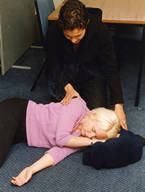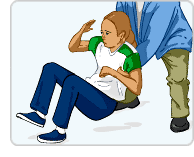SEIZURES
Introduction
A seizure - also called a convulsion or fit - consists of involuntary contractions of many muscles in the body.
The condition is due to a disturbance in the electrical activity of the brain. Seizures usually result in loss or impairment of consciousness.
The most common cause is epilepsy. Other causes include:
- head injury,
- some brain-damaging diseases,
- shortage of oxygen or glucose in the brain,
- and the intake of certain poisons, including alcohol.
Epileptic seizures are due to recurrent, major disturbances of brain activity. These seizures can be sudden and dramatic. Just before a seizure, a casualty may have a brief warning period (aura) with, for example, a strange feeling or a special smell or taste.
No matter what the cause of the seizure, care must always include maintaining an open, clear airway and monitoring the casualty's vital signs - level of response, pulse and breathing. You will also need to protect the person from further harm during a seizure and arrange appropriate aftercare once they have recovered.
Symptoms
- Sudden unconsciousness.
- Rigidity and arching of the back.
- Convulsive movements.
In epilepsy the following sequence is common:
- The person suddenly falls unconscious, often letting out a cry.
- They become rigid, arching his back.
- Breathing may cease. The lips may show a grey-blue tinge (cyanosis) and the face and neck may become red and puffy.
- Convulsive movements begin. The jaw may be clenched and breathing may be noisy. Saliva may appear at the mouth and may be blood-stained if the lips or tongue have been bitten. There may be loss of bladder or bowel control.
- Muscles relax and breathing becomes normal; the person recovers consciousness, usually within a few minutes. They may feel dazed or act strangely. They may be unaware of their actions.
- After a seizure, the person may feel tired and fall into a deep sleep.
Goal
- To protect the person from injury.
- To give care when consciousness is regained.
- To arrange removal of the person to hospital if necessary.
Treatment
- If you see the person falling, try to ease the fall.
- Make space around them; ask bystanders to move away.
- Remove potentially dangerous items, such as hot drinks and sharp objects.
- Note the time when the seizure started.
- If possible, protect the person's head by placing soft padding underneath it.
- Loosen clothing around the neck.
When the seizure has ceased:
- Open the airway and check breathing.
- Be prepared to give rescue breaths an chest compressions.
- Place them into the recovery position if the person is unconscious but breathing normally.
- Monitor and record vital signs - level of response, pulse and breathing.
- Note the duration of the seizure.
CAUTION:
- DO NOT move the person unless they are in immediate danger
- DO NOT put anything in their mouth or use force to restrain them.
WARNING:
If any of the following apply: DIAL 911 for an ambulance.
- The person is unconscious for more than 10 minutes.
- The seizure continues for more than 5 minutes.
- The person is having repeated seizures or having their first seizure.
- The person is not aware of any reason for the seizure.
Disclaimer: This information is not intended be a substitute for professional medical advice. It is provided for educational purposes only. You assume full responsibility for how you choose to use this information.





